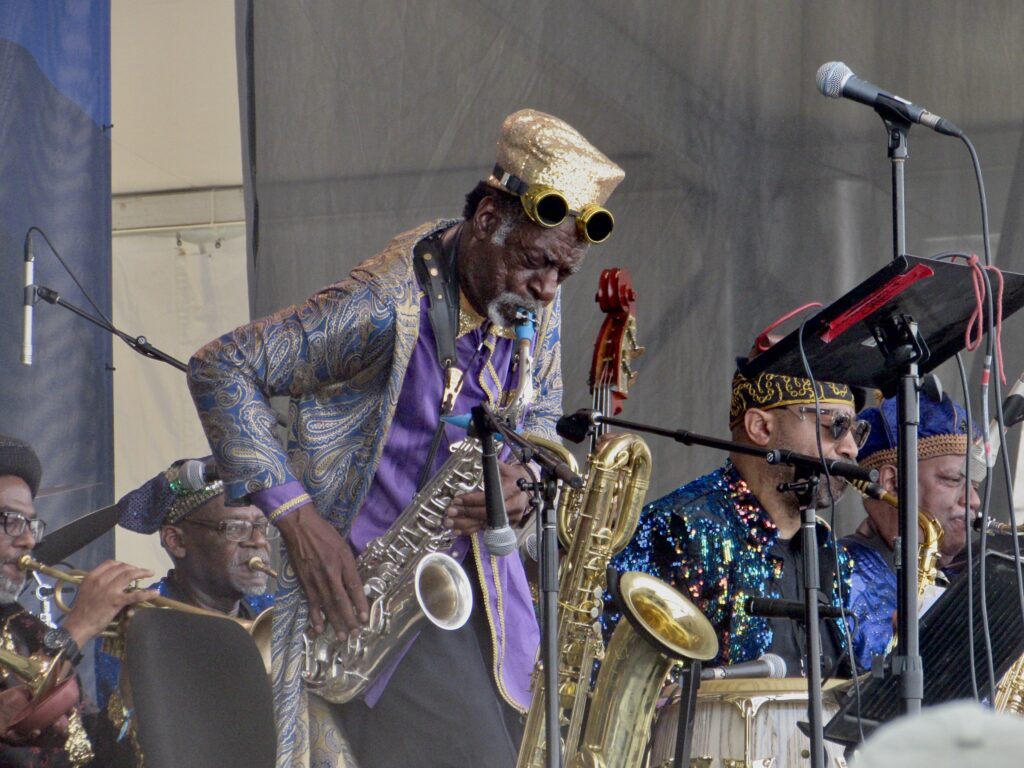
Sun Ra Arkestra on the Fort Stage
After 70 years, the late George Wein’s Newport Jazz Festival continues to curate a stunning collection of live music on the water in Newport, Rhode Island. From hosting icons to new artists or fresh talent that become legends, the festival historically ensures that its attendees are in for a once-in-a-lifetime musical experience. Each lineup is filled with incredible jazz artists, but also does not refrain from including related genres like disco, funk and blues. On the sunny, humid first weekend of August, jazz lovers fill Fort Adams State Park for the 70th anniversary, prepared to brave the heat for the special occasion.
Friday
Cisco Swank opened the Quad Stage, which can be found within the fort. “It felt like I was welcoming people into the festival,” says the rising musician while enjoying the Harbor Stage after his set. He greeted people with some of his recorded work and incorporated improvisational moments with his band. Enjoying his time on stage and kicking off the day at such an iconic festival, Cisco felt that the set flew by compared to his other gigs.
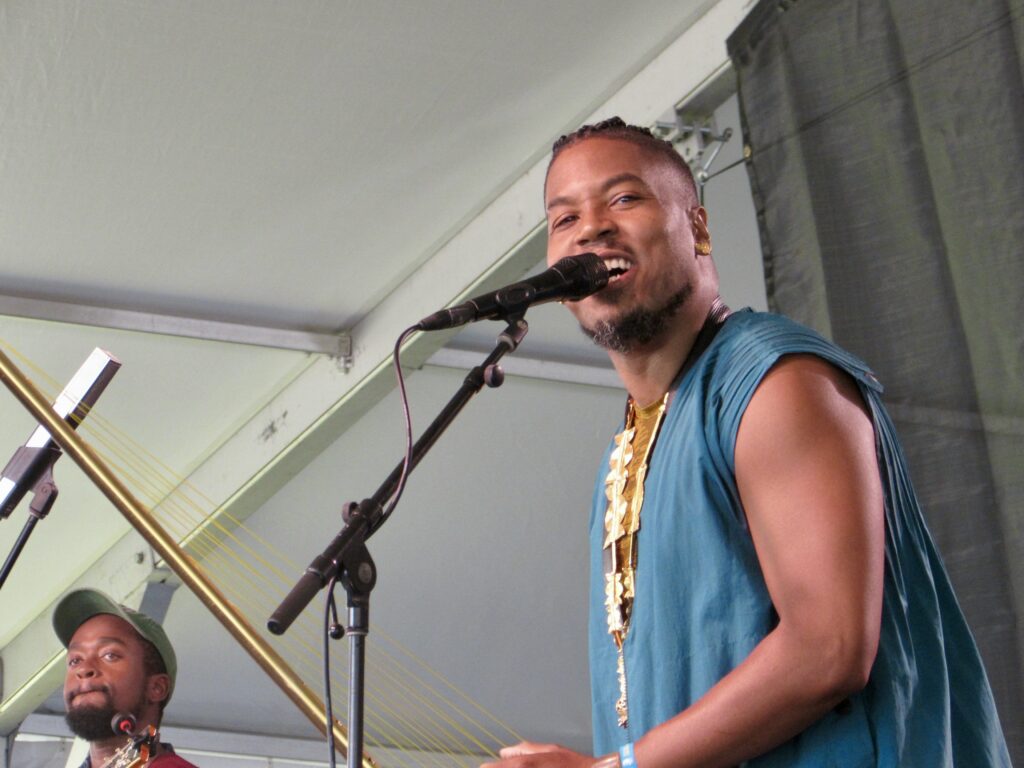
Chief Adjuah on the Quad Stage
Eager to keep the day moving, Chief Adjuah started his set by saying “fuck the soundcheck, let’s have some fun!” He enters the stage with his electric harp, an instrument he’s developed alongside a plethora of other modified brass instruments. His voice held a smooth tone, which blended well with the array of unique instruments used by his band. Most of his set included intricate, heavy drum patterns that got the audience moving swiftly. He also shouted out the Newport Jazz Camp kids in the audience, acknowledging the presence of the next generation of jazz musicians. With a smile on his face that you could hear through his singing, he maintained the momentum that Cisco Swank started on the Quad Stage.
As a nod to the festival’s notable past, the remainder and expansion of jazz great Sun Ra’s band, Sun Ra Arkestra, took the festival’s main Fort Stage. The group proved to be a collective of talented musicians dedicated to the craft of honoring Sun Ra’s legacy. The group ranged in age, but this contrast became blurred when one of the older members of the band came to the front of the stage and started flipping and cartwheeling alongside the psychedelic instrumentals played by the band. The group aced Sun Ra’s psychedelic sound with cutting, dissonant piano chords, cascading guitar sounds, and an erratic flute solo.
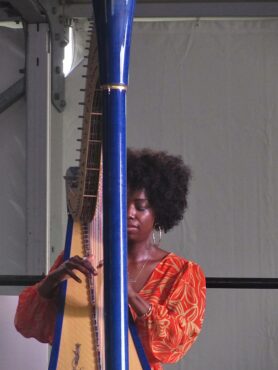
Brandee Younger on the Harbor Stage
The Harbor Stage was placed just outside the entrance to Fort Adams’ quad entrance, which attracted many passersby to the stage’s sets. Attendees stopped in their tracks at the sound of harpist Brandee Younger. Proceeding with historical nods, Younger started with an Alice Coltrane arrangement, which elicited cheers from the crowd upon the song’s introduction. Each solo played by Younger carried an ethereal sound, varying between deeper and higher elements and displaying her expertise. Her set also featured an impressive drum solo from Makaya McKraven, who also had his own set later on in the weekend. Younger ends her set with a creatively reimagined cover of Marvin Gaye’s “I Want You,” translating the legend’s vocals to harp strings.
Attendees flocked to the Fort Stage mid-afternoon to secure a spot for André 3000’s highly anticipated set. Veering from the Outkast sound that many know and love him for, André played a set full of music from his new, flute-filled album, New Blue Sun. The set began with thunderous drums and spacious synth, setting the avant-garde tone of what was to come. André played multiple flutes throughout the set, including Mayan, digital and bamboo flutes. He informed the audience that he and the band were improvising based on the audience’s presence. “Whatever you brought with you today and you’re giving to me, we’ll play back to you.” For a moment, his flute playing sounded similar to a gull, emulating the environment in which he was playing.
Brittany Howard wasted no time in showing the audience the talented force that she is, immediately filling the space of the quad with her forceful vocals. Between buttery head voice, strong belts and gritty growls, Howard’s vocal range and control demanded the crowd’s attention. Her setlist invited audience members to dance, as it was full of poignant bass and undeniable groove. “The vibe here is immaculate!” says Howard, between songs. She’s also joined by saxophonist Jaleel Shaw — who had a set on the Harbor Stage earlier in the day — for a mesmerizing saxophone solo. Her stage presence captures attendees, taking their energy and giving it right back. Between club-like beats and distorted guitar, Howard effortlessly transitioned between genres and enhanced the welcoming nature of the festival.
Saxophonist Kamasi Washington ended Friday with rolling drums that rumbled past the ocean’s edge surrounding the Fort Stage. Washington would sporadically interupt the drums with complex passes on the saxophone. He also invited DJ Battlecat to join him and spin some George Clinton. To keep all jazz listeners intrigued, he ensured that his setlist touched on all the subsections of jazz and the genres that often intertwine with jazz, such as blues and funk.
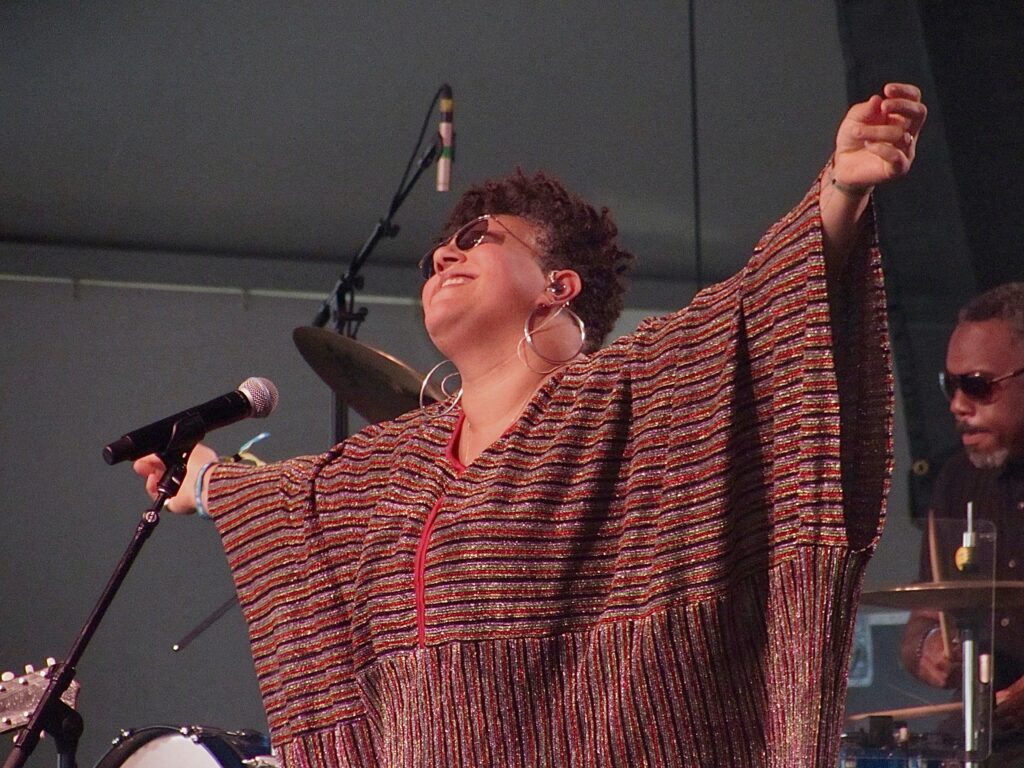
Brittany Howard on the Quad Stage
Saturday
Three-piece Golden, Brown & Delicious — consisting of guitarist Mark Whitfield, bassist Robert Hurst and drummer Jeff “Tain” Watts — provided the crowd with a fluid transition from morning to afternoon with a smooth jazz-driven set. Whitfield graced listeners with expansive jazz guitar, emitting a rounded sound and a clear presence of skill. The trio both looked and sounded in tune with one another, maintaining eye contact and contracting their bodies in sync with the rhythm. Hurst played the double bass with confidence, while Watts ended the set with a heavy kick-drum finish.
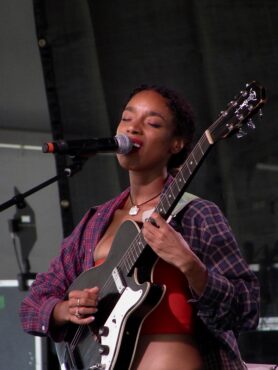
Lianne La Havas on the Quad Stage
Lianne La Havas took the Quad Stage after the group of three for her first appearance at the festival. She started solo, standing alone in the middle stage with her guitar. La Havas’s delicate, supported voice enchanted the audience and she made her difficult runs sound facile. She also displayed strict control over her dynamics when she seamlessly jumped from her sustained head voice to a strong belt during “Green & Gold” and “No Room For Doubt.” Pianist Julius Rodriguez joined La Havas 24 hours before his own Quad Stage set for a handful of songs, which included her cover of Radiohead’s “Weird Fishes/ Arpeggi.” The cover excited the audience upon the first few notes of the song’s distinguishable guitar riff. To end her set, she invited the crowd to join her for backup vocals, creating a chorus out of the crowd.
Returning to the main stage, Best New Artist Grammy winner Samara Joy entered the stage to an immediate roar of cheers. Joined by a miniature jazz big band, Joy cut to the chase and made sure attendees were aware they were in for a master class in vocals for the next hour. Between jumping octaves, expert-level scatting and sustained belts, Joy entertained the crowd to the point where the audience cheered multiple times throughout every song. She expressed her gratitude to be performing on a stage that many jazz greats took before her and further emphasized her graciousness with her setlist. She performed a Sun Ra composition and Thelonious Monk’s “Worry Later,” where she sang the lyrics at a stunning speed. After an honorable introduction highlighting Billie Holiday’s greatness, Joy also sang Holiday’s unrecorded song “Left Alone,” which reduced the crowd to a pin drop in a moment of focus.
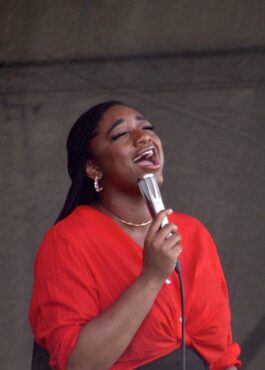
Samara Joy on the Fort Stage
To eliminate any chance of a dull moment in the day, the Quad Stage seating section was cleared to create a dance floor for the all-vinyl DJ set by Acid Jazz Is Dead. The DJing duo Adrian Younge and Ali Shaheed Muhammad curated a set of disco, jazz and funk music for attendees to groove into the evening part of the festival. Some tracks included “Cosmic Girl” by Jamiroquai, “It’s Just Begun” by The Jimmy Castor Bunch, “Evil Vibrations” by the Mighty Ryeders and “Keep On Movin’” by Soul II Soul and Caron Wheeler. They would also intermittently pause the music to let the audience sing to their favorite tracks alongside their friends. Safe to say, it was what the crowd needed to keep their energy up for the rest of the evening.
Upright and electric bass legend Stanley Clarke and his touring band 4Ever performed at the Harbor to a packed crowd. Grouped at the very front of the stage, the group was not only tight-knit in their placement, but also in their synchronized sound. Clarke often played the same parts alongside his band members, such as his guitarist Colin Cook and saxophonist Emilio Modeste. Playing a trick on the crowd, keys player Beka Gochiachvili played what sounded like a xylophone solo on his keyboard. Drummer Jeremiah Collier appeared to play effortlessly despite the intricacy of his sections. Clarke also partnered with Collier by playing percussive elements by hand on the neck of his upright bass.
To complete Saturday, Kamasi Washington, vocalist and rapper Terrace Martin and pianist Robert Glasper teamed up to perform as “Dinner Party” and invited everyone at the festival to the table. Listening to the set felt like you were intruding on a dinner party full of talented musicians having a jam session, incorporating all of their individual skills. The bass and drums rattled the ground, likely sending ripples out to the ocean. Washington performed a raspy, range-traveling saxophone solo, which elicited cheers from those who didn’t get enough of him the night before. Martin also produced layered vocals, Glasper added intriguing synth elements and DJ Battlecat joined the group to spin some George Clinton.
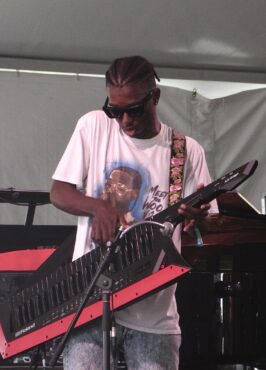
Julius Rodriguez on the Quad Stage
Sunday
Grammy-winning pianist Julius Rodriguez started Sunday with a slick-looking keytar and was joined by a group of skilled musicians. In addition to his keytar, he also had a keyboard and grand piano to work with. Taking a page out of Stanley Clarke’s book, he also had saxophonist Emilio Modeste join him for the set to contribute great saxophone segments. Rodriguez expressed his gratitude for a slot at the festival and shared that he and trumpeter Alonzo Demetrius Ryan used to attend the festival together when they were younger before sharing the stage. Ryan also contributed unique sounds from his trumpet through pedals, giving the brass instrument the sound of a synthesizer or immense reverb. “Run To It (The CP Song)” appeared to have a heavy blues influence, especially with a smooth electric bass solo and strong piano chords. Rodriguez played a piano solo during “Around the World” that featured his award-winning abilities and beautifully transitioned to Ryan taking over for his respective solo.
Afro-Cuban artist Cimafunk bolstered Sunday’s energy with his nine-person band from Havana, Cuba. Much of his setlist includes funk music with Latin influences, which got the audience moving to the point where they disregarded the standing space guidelines to create their own dance floor. The set included a wide variety of percussion, as well as impressive vocals and instrumentals from trombonist Ilarivis Garcia and saxophonist Katerin Llerena, who Cimafunk referred to as “the queens of the band.” Those in the VIP area next to the stage were just as hype as the crowd, performing what appeared to be a pre-choreographed dance in unison. Overall, the set was easily the most energetic of the weekend because Cimafunk and his band’s energy was undoubtedly contagious.
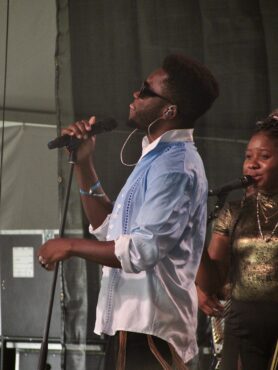
Cimafunk on the Quad Stage
Just after playing Lollapalooza with the Chicago Philharmonic Orchestra, Laufey returned to Newport to play the Fort Stage after playing the Harbor Stage two years prior. Her fans — donning hair bows and long skirts — inched closer to the stage as she ran out in a polka-dot, ruffled Rodarte dress (which she later compared to a dragonfruit on her Instagram). Laufey showed off her piano skills in a captivating solo as a part of “Like The Movies,” which also starts and ends with “Misty” by Erroll Garner. “Fragile” was enhanced by airy harmonies that increased dynamically alongside the instrumentals. A powerful string quartet also added swelling, mesmorizing elements to nearly every song. Laufey also solidified her vocal talent by belting the bridge to “Goddess” and sent the crowd into a cheering frenzy. To end the set, she played her recently released cover of the jazz standard “It Could Happen To You” to include those who may not have been familiar with her discography. She kept a smile on her face for her entire set and was not shy of expressing her gratitude for her appearance on the main stage at such a historic event.
Back at the Quad Stage, rapper and poet Noname entranced the crowd with her powerful lyrics, whilst also keeping the large crowd she gathered moving. She’s accompanied by strong, intricate drums that move with her remarkable flow. Noname also invites the crowd to yell “Woo!” back to her in a call and response form during “boomboom.” Vocalist Abena also joined Noname for captivating vocals that further enhanced Noname’s already notable setlist. With incredible rapping speed and no sign of fatigue, Noname ensured that the afternoon energy would not be lost.
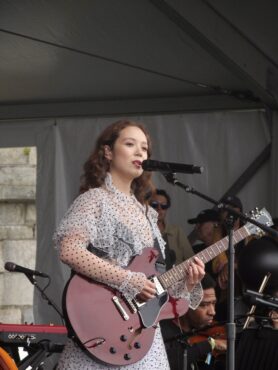
Laufey on the Fort Stage
Drummer Makaya McKraven and guitarist Jeff Parker paired on the Harbor Stage up to play a set full of incredible skill on their respective instruments. The duo played each other’s music, as well as some interpretations of songs by jazz greats. McKraven and Parker have been friends and collaborators for a long time, which was noticeable in their ability to understand each other and be on the same page musically throughout the set. “He’s my dude and one of my favorite musicians, he plays with so much heart, energy and creativity,” says Parker, highlighting his appreciation for McKraven.
Outside of a great friendship, their connection as musicians allows them to collaborate effectively in any setting. “It was really dope to find a guy who’s so well versed and has so much vocabulary in Black music from straight jazz to avant-garde, but also is really into hip hop, producing beats and doing all of this contemporary music…that really drew me to him as an artist in the breadth of what he could do and how he connected with what I did,” says McKraven.
The crowd was enamored by the sound of two adept musicians that have an honest love for jazz and what it can become, especially during their favorite songs to play live: Parker’s “Max Brown” and McKraven’s “Dream Another.” “We’re both improvising musicians who come from a jazz tradition, but we both approach our music compositionally from more of a production aesthetic, which in my view is a more contemporary and newer way of looking at things,” says Parker, explaining his collaboration process with McKraven.
To close out the festival, Nile Rodgers and CHIC grooved enough to hold off the impending storm. Despite the dark clouds surrounding Fort Adams, attendees risked a downpour to hear the legend and an updated CHIC lineup perform some of their greatest hits. They also played of cover of “Lose Yourself to Dance” by Daft Punk and Pharell Williams, encouraging the audience to sway their arms to the beat. While Rodgers entertained the crowd with his iconic musicianship, vocalist Kimberly Davis hit every difficult note that the CHIC catalogue entails. Since the skies opened up just after their set, it was almost fate that the group closed the 70th Newport Jazz Festival.
